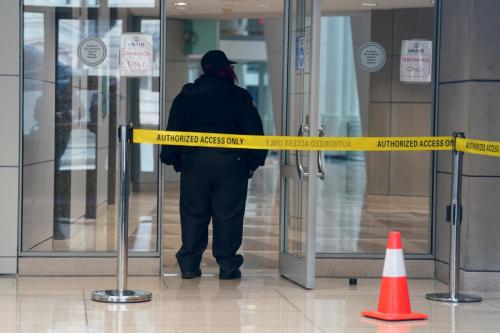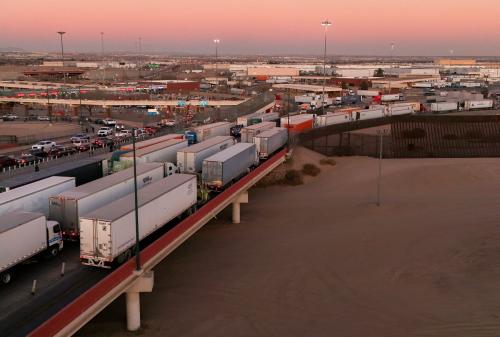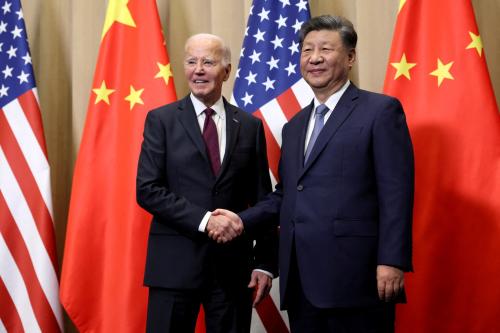

5:30 pm EDT - 7:00 pm EDT
Past Event
Content from the Brookings Doha Center is now archived. In September 2021, after 14 years of impactful partnership, Brookings and the Brookings Doha Center announced that they were ending their affiliation. The Brookings Doha Center is now the Middle East Council on Global Affairs, a separate public policy institution based in Qatar.
On May 31, 2012, the Brookings Doha Center (BDC) hosted Pakistani Foreign Minister H.E. Hina Rabbani Khar as part of its Distinguished Lecture Series. The event, held at the Ritz Carlton Hotel in Doha, focused on Pakistan’s role and ambitions in its regional sphere and the broader shifting global order. Khar’s address was followed by a lively discussion with attendees from Qatar’s academic, business, diplomatic, and media communities, and was moderated by BDC director Salman Shaikh.
Khar began by laying out her “hopes and fears” for Pakistan’s place in the world. While she feared that Pakistan and its religion would continue to be “misrepresented” globally, her hope was that the sacrifices made by her country in its efforts to reform would be recognized on the world stage. Khar called on global leaders to apply a “common lens of humanity” to allow Pakistan and its allies to “work through problems together.”
Speaking of the challenges facing Pakistan today, Khar said that her government’s goal was to improve the opportunities of the individual citizen. Progress has been made in that regard, and lessons learned. In particular, she cited the introduction of universal education as an important step. Individual opportunity and prosperity cannot be guaranteed without peace and stability in the regional sphere, however, Khar added. She emphasized that the spillover of conflict from Afghanistan had an “instantaneously destabilizing effect on Pakistan,” and that Islamabad is now reaching out to Kabul to build trust and “move into a new realm of brotherly relations.”
Improving relations with India, meanwhile, is a greater challenge, Khar said. In the past, both India and Pakistan have “invested a great deal of intensive hostility” in their relationship. The foreign minister stressed that it is now important that these two neighbors see each other as “common citizens of the same region” and build trust in areas that can be developed. One important endeavor prioritized by Khar was the normalization of trade relations with India, on hold since 1975.
Speaking about Pakistan’s relations with the West, the foreign minister commended European countries for recognizing the sacrifices that Pakistan had made in its efforts to pursue democratic reform. In return for those sacrifices – which included $7 billion spent, a near 50 percent drop in FDI, and great human loss caused by the militant backlash – Pakistan is seeking preferential trade agreements. A summit-level dialogue between the EU and Pakistan has now started negotiations in that regard. Khar emphasized, however, that Pakistan does not seek material support in its democratization efforts, which must be pursued in a spirit of popular ownership.
Relations with the United States have been more troubled, Khar said, adding that 2011 in particular had been “a very tough year.” The United States and Pakistan have longstanding ties, and share the same objective of achieving regional peace and stability. Recently, however, there have been too many U.S. actions that violate the terms of what is acceptable to Pakistan. Khar expressed shock at what she called the “demonization of Pakistan,” simply for being unwilling to send its soldiers to fight militancy. She called for an environment of mutual trust, and the establishment of tools to fight insurgents, which “aren’t counterproductive and do not provide fuel for further militancy.” It is unreasonable, Khar stated, for Washington to pursue unilateral interests in ways that cause internal damage to Pakistan, while forcing it to bear the costs. On top of that, blaming Islamabad for incidents such as the recent attacks in Kabul, was in her view “preposterous, counterintuitive, and counterproductive.”
In response to a question about the Pakistani government’s ability to control bilateral military relations with the United States, Khar said that 60 years of military rule had left a degree of disunity among the different branches of power. She stressed, however, that there is now a “broad maturity” in Pakistani governance, and the different branches have been able to unite on matters of national interest. She added that a current parliamentary review on relations with the United States offers an important opportunity to clarify the relationship and “put it right this time.” Part of improving the relationship, she said, should include looking at preferential market access.
Asked about efforts to build new relationships to promote growth, Khar stressed that Pakistan had been spearheading regional development through a number of joint initiatives. She said that building these “connectivities” – such as the Iran-Pakistan pipeline or a transit trade agreement with Afghanistan – encourages a “common future for the region where stability is key.” Ever-improving relations with Gulf states, including through the establishment of free trade agreements, are also central to efforts for greater regional integration. GCC countries have been an important partner in trade, as well as a source of income through remittances, Khar added.
On the subject of her approach to ongoing uprisings in the Arab world, Khar emphasized that Pakistan would “continue to engage with newly democratic states.” She stated, however, that external actors must “respect the sovereignty, independence, and territorial integrity” of these countries. Change must be internally driven, she said; imposing it from the outside “can have serious and catastrophic results.” Where there is a conflict between nations’ sovereignty and the international community’s responsibility to protect civilians, the charter of the UN, in her view, “should remain and be respected” until a new consensus is reached.
One audience member asked whether rapprochement with India could include nuclear disarmament, and whether military spending could be more usefully directed toward development efforts. Khar stressed that Pakistan’s nuclear weapons were “developed in reaction to a threat” and that Islamabad would “never be the first-mover in an escalation.” Mentioning past failed efforts to reach an agreement on de-militarization, she said that the political costs of such measures are huge and that there was a need for more courage in moving forward. While an improved environment for relations with India was a welcome development, it was not an end in itself, she stated, and more tangible action would be needed in the future.
5:30 pm - 7:00 pm
H.E. Pakistani Foreign Minister Hina Rabbani Khar provided an insider’s perspective behind the motivations of the nation’s foreign policy in this challenging time, in particular its growing relations with the Gulf States and with rising Asian powers, especially India and China. The foreign minister answered questions about Pakistan’s drivers and ambitions as a player in both South Asia and the broader changing global order.

Scott R. Anderson, Vanda Felbab-Brown, Jeffrey Feltman, Caren Grown, Michael Hansen, George Ingram, Thomas Pepinsky, Anthony F. Pipa, Ghulam Omar Qargha, Molly E. Reynolds, Sweta Shah, Landry Signé
February 4, 2025

Joshua P. Meltzer
February 3, 2025

Ryan Hass
February 3, 2025